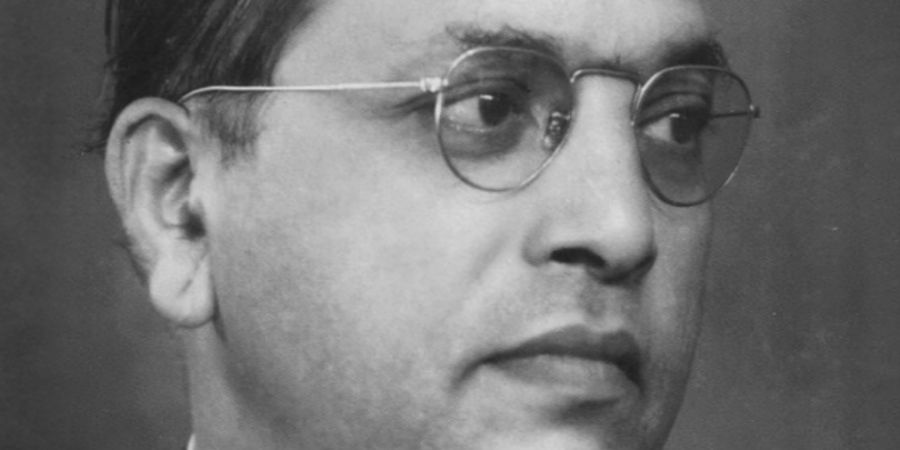

Bhimrao Ambedkar was born to a poor Dalit father Ramji Maloji Sakpal and mother Bhimabai in a small Mhow village of Madhya Pradesh, nobody knew that he would grow up to be a great leader. Every year, his birth date, 14th April 1891, is celebrated as Ambedkar Jayanti in India. If Ambedkar needed to, the peon used to pour the water from a height to avoid any touches with the water container. In a word, he had to go through an unimaginable painful phase in his childhood, which no one deserves.
B. R. Ambedkar, along with his family, moved to Bombay (presently Mumbai) in 1897 and became the only untouchable to be admitted to Elphinstone High School.
Though he hailed from a socially backward class and faced discrimination at every stage of his life, it never stopped him from becoming one of the greatest scholars of all time.
Moreover, his childhood was a series of struggles to fight prejudice for being Untouchables or Dalits. His teachers and the other upper caste students would not allow Ambedkar to sit near them. He was not allowed to touch the earthen pot to drink water. Yet, he was not discouraged and continued to excel in academics. After attaining his degree from the Elphinstone College, Bombay, he obtained his postgraduate degree from the London School of Economics.
He further continued his doctorate in political science and economics from the University of Columbia, USA.
He was a social activist, economist, reformer, and politician. He held the post of the first law minister of our Independent India. He was recognized as one of the greatest scholars and was invited to lead the committee to draft the Indian constitution. He wanted to bring about dynamic social reforms in India.
Babasaheb Ambedkar was a victim of untouchability from the very beginning of his school days. His professional life is not different from that. He started his career as a private tutor, as a consultant and then investment consultant. But he failed when the clients found he is untouchable.
After that, Bhima Rao Ambedkar tried his luck in the legal profession. He defended a lawsuit for a non-Brahmin person to win a case against a Brahmin person accused of ruining Indian social values. He was always committed to promote and uplift the education of the untouchables.
He even established an institution of them to study. Later he was appointed to Bombay Presidency Committee to work with the Simon Commission, which raised a great outrage across the whole country.
He took a step further to strengthen the campaign against the caste discrimination by launching a protest to open up the public water resources to the Dalits. Bhima Rao Ambedkar even condemned the ancient Hindu ideology in the open forum which justifies the caste system of the country.
During 1932, the British announced a separate electoral process for the depressed community of the society. Mahatma Gandhi strongly protested against the same by hunger strike in Poona (now Pune). The then congress members discussed and signed Poona Pact with Ambedkar, which ensures reservation of seats to the backward castes in the provisional legislature.
His political career started in the year of 1926, as he was nominated as a member of the Bombay Legislative Council. He continued his efforts for the reformation of the Indian Economy. He served this post till 1936. In 1935, he was named as the principal of Government Law College, Bombay, for two years.
Dr Babasaheb Ambedkar also served as the chairman of the Governing body of Ramjas College, University of Delhi. After the death of his wife, whose long-standing wish was to go on a pilgrimage to Pandharpur, he could not do so as the untouchables were not allowed there as per the Hindu beliefs. He always expressed his views to leave the Hindu religion and build a new religion.
Bhima Rao Ambedkar published a book named “Annihilation of Caste,” where he criticized the Hindu religion for its support for caste discrimination. He founded the Independent Labour Party, which contested Bombay Election in 1937. He was also elected as MLA of this legislature and served in the opposition party.
To take the campaign forward, he founded the All India Scheduled Caste Foundation. He also conveyed his views on the formation of untouchable castes. In 1952, he took part in Indian General Election but unfortunately; he lost to his former assistant and Congress party candidate, Narayan Sadoba Kajriolkar.
Ambedkar again tried to enter the Lok Sabha in 1954, but again, he failed. He twice became the Member of Parliament representing Bombay State in Rajya Sabha. During the second term, he died.
In 1947, upon the independence of India on 15th of August; the congress led all the party to form the Government. They asked Babasaheb Ambedkar to serve as Justice and Law Minister, which he accepted. He was also appointed the chairman of the Indian Constitution Drafting Committee.
Bhima Rao Ambedkar was undoubtedly the most suitable person for this job. He had vast knowledge about the Constitution. He studied constitutions of 60 countries. He was recognized as the “Father of Indian Constitution”.
Ambedkar draft was described as a social document which either directly points towards a social reformation or attempts to execute the same by incorporating certain conditions. His text was directed towards protecting civil liberties of each of the individuals, freedom of religion, the abolition of untouchability and outlawing all kinds of discriminations.
Dr. Babasaheb Ambedkar extensively fought for the economic and social rights of women. He convinced Assembly to introduce reservations for jobs in civil services, schools and colleges for the members of the Scheduled Caste, Scheduled Tribes and Other Backward Classes. The Constitution was adopted on 26th November 1949 by the Constituent Assembly.
He was always against Article 370, which granted special status to Jammu and Kashmir state. He said that this section was included in the Indian Constitution against his wish.
He also firmly believed that this was unfair by Kashmir to expect India to provide military and other necessary services, but to not merge with it.
He was to support introducing a uniform civil code. He debated in Assembly in favor of the same. But when the Assembly holds his drafted Hindu Code Bill, he resigned from the cabinet in 1951.
At 15, Dr Babasaheb Ambedkar marriage was arranged with a nine-year-old girl named Ramabai. After being elected as the principal of Government Law College, he settled in Bombay. He oversaw the construction of a house Rajgruha and stocked his library with over 50,000 books.
But in the same year, his wife died after suffering from a long illness. After completing his drafting work of Constitution of India, he had insomnia, pain in his legs and acute diabetes.
He took insulins and homeopathic medicines. He went to Bombay for treatment, where he met with Dr. Sharada Kabir. He, later on, he married her in 1948. She adopted a new name of Savita Ambedkar, who looks after him for the rest of his life.
Bhima Rao Ambedkar was always against the orthodox religious restrictions of Hinduism. He never wanted to die as a Hindu. He also made his followers believe the same.
At first, he thought about adopting Sikhism. But after meeting with Sikh leaders, he came to know that they will be given a second category status.
That’s why Bhima Rao Ambedkar left Hinduism. He didn’t want to fall in the same trap again. So he turned his face towards Buddhism. He studied Buddhism all his life. He traveled to Ceylon (now Sri Lanka) to attend the World Fellowship of Buddhists and converted into a Buddhist.
Since the year of 1948, Ambedkar suffered from diabetes. He was in bed for a long time because of medication side-effects and poor eyesight.
He had been increasingly embittered by political issues, which took a toll on his health. His health worsened during 1955. Dr. Babasaheb Ambedkar died in his sleep on 6th December 1956 at his home in Delhi.


